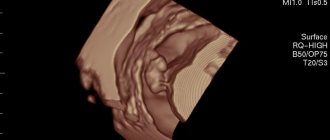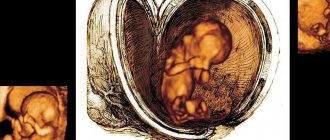Baby movements at 18 weeks
Not every woman can feel the baby's movements at 18 weeks.
This is not to say there is cause for concern. Doctors say that during a normal pregnancy, the baby’s movements are first felt by the mother between 16 and 22 weeks. Therefore, if there are no sensations by 18 weeks, it may be worth waiting a little longer. Those women who felt the unforgettable first movement will now have to constantly listen to the movements of the baby. Using them, the expectant mother can determine the child’s well-being. The child's sleep and wake periods are approximately 4 hours. Too frequent or, conversely, too infrequent and sluggish fetal movements may indicate a problem. It is worth sharing this with your gynecologist and jointly determining whether there is cause for concern.
What's happening
During this period, the development of the child’s brain continues, and subcutaneous fat gradually accumulates. By the end of the 18th week of pregnancy, the external and internal genital organs of the fetus will be fully formed, and during an ultrasound you will be able to find out who has settled in your tummy.
The baby’s immune system is also improving: by the 18th week of pregnancy, his body begins to produce interferon and immunoglobulins, designed to protect the baby from infections and viruses.
A pattern unique to him has appeared on your baby’s fingers. The rudiments of teeth have formed, the child is able to hear, but the development of the organs of vision has not been completed, but by the 18th week of pregnancy the baby can already distinguish between light and dark.
Sex
Intimate relationships benefit a pregnant woman, confirming her own attractiveness. But it should be taken into account that as the tummy grows, partners need to take special care and choose comfortable, safe positions.
Contraindications to sexual intercourse at week 18:
- Placenta previa;
- Increased tone of the uterus;
- Infections in a partner;
- Pregnancy with twins.
How you feel
By the 18th week, your weight has increased by about 4 - 5 kg compared to the “pre-pregnancy” state. The appetite has increased, but if you follow all the desires of the body, there may be a risk of rapid weight gain. Therefore, it is extremely important to eat right.
Some women at 17-18 weeks of pregnancy notice deterioration in vision: light flashes, flickering, blurred images before the eyes, distortion of the outlines of objects, and a narrowing of the visible area may occur. For any complaints, you should definitely go to an ophthalmologist, since even the most minor symptom can be a sign of a serious complication.
At the 18th week of pregnancy, increased production of melanin continues, which is why more and more dark spots appear on the body. Where the skin is especially delicate (in the armpits, on the neck, under the breasts), papillomas often form. After childbirth, some of them will disappear, but some may remain. And expectant mothers at 18 weeks of pregnancy are often bothered by skin rashes (common acne or raised red plaques). As a rule, they do not require treatment and go away on their own.
As your uterus grows, you may feel pressure in your belly button area. This is normal and there is no need to worry too much. Also, at the 17th - 18th week of pregnancy, many women experience discomfort in the lower abdomen. They resemble menstrual cramps in nature. If you also notice something similar, do not be alarmed: this is how your body prepares for childbirth.
Pain in the legs and back can cause considerable discomfort during the 17th – 18th week of pregnancy, especially after physical exertion and prolonged walking. A special bandage will help reduce pain in the back, and to prevent your feet from getting so tired, wear comfortable shoes with low, stable heels. Also, a traditional problem during this period is constipation. You can solve this by introducing foods containing fiber into your diet.
One of the most common complaints during the 18th week of pregnancy is insomnia, which can be caused by a growing belly that prevents the body from finding a comfortable position. Try to sleep on your right side, using a special pregnancy pillow or simply placing a soft cushion between your legs.
As a rule, breast tenderness decreases by the 18th week of pregnancy, and colostrum is released from the mammary glands. To prevent it from staining your clothes, purchase special breast pads. Under no circumstances should you squeeze it out, because stimulation of the nipples can tone the uterus.
Weight
If from the first days of pregnancy a woman gained no more than 5.5 kg until the 18th week, this is considered normal. Maintaining optimal weight gain will help make pregnancy easier and bounce back faster after childbirth. Overweight women are more likely to have pregnancy pathologies due to excessive stress on all organs, experience difficulties during childbirth, and take longer to recover after it.
If necessary, you need to seek help from a nutritionist to create an individual diet that helps maintain optimal weight and does not limit the baby in nutrients.
Risk factors
If you have already felt your baby moving in the 18th week of pregnancy, it’s time to start listening to his behavior. When your little one is awake, monitor the number of his movements: normally, the fetus moves from 4 to 8 times in one hour. If you notice excessive baby activity when you are 17 to 18 weeks pregnant, this may be a sign of a lack of oxygen entering the placenta. You should definitely inform your doctor about your baby’s increased mobility: a specialist will determine the reason for the baby’s activity and give you appropriate recommendations.
A dangerous phenomenon in the 18th week of pregnancy is dizziness, which usually occurs due to a decrease in blood pressure or a decrease in the amount of hemoglobin in the blood. Such conditions of the expectant mother require medical supervision, as there is a risk that one day you may lose consciousness and harm yourself and the baby.
Like any other period, the 17th - 18th week of pregnancy is a time characterized by the risk of premature birth. If you experience symptoms such as pain in the lower abdomen and lower back, bleeding, consult a doctor immediately.
18th week of pregnancy: what to look for
- Eat foods rich in omega-3 polyunsaturated fatty acids. Nowadays it is very important to get nutrients for two at once, and omega-3 fatty acids are an essential component of a healthy diet. Omega-3s help develop the nervous system of the unborn child. According to research, these acids also strengthen the mother's immune system and help cope with symptoms of depression. Choose foods that are high in omega-3s: fatty fish such as salmon, plant sources such as flaxseeds, broccoli and walnuts. You can find even more information on how to eat healthy during pregnancy in our pregnancy guide.
- Gradually increase your caloric intake. A growing baby will need a lot of calories, but that doesn't mean you have to eat for two. In the second trimester, you can add 300 calories (that's half a sandwich and a glass of skim milk) to your average 2,000-calorie diet per day. When adding calories to your diet, find out what weight gain is acceptable during pregnancy, because this is a common cause of worry for expectant mothers!
- Suddenly, everyone around you - from your mother-in-law to passers-by on the street - will start giving you advice on how and what to do during pregnancy. Although unsolicited advice can be annoying, treat it philosophically. You don't have to make excuses to anyone. Use the universal answer: “Thank you, I’ll keep it in mind for the future.” And don’t forget that your advisors really want the best for you and are happy for you. Perhaps some advice for expectant mothers will really be useful.
Recommendations
Continue to eat a healthy diet during your 18th week of pregnancy. Have a full breakfast and for lunch eat a meat dish (beef, rabbit, chicken, turkey): protein is needed for normal fetal development. Fresh fruits, berries, vegetables, biscuits, and unsweetened yogurt without artificial additives are great for a light snack. To prevent constipation, drink a glass of kefir at night.
17 - 18 weeks of pregnancy is a period when your kidneys are working harder, so you have to run to the toilet more often. Empty your bladder on time and avoid stagnation of urine: this will help prevent the development of infection.
If you experience dizziness with a sudden change in body position, do not get up immediately after sleep. First, sit on the edge of the bed for a few minutes, and only then you can slowly get up. And if at 18 weeks of pregnancy you feel tired during the working day, try to retire to a secluded place and rest for 10 - 15 minutes.
Nutrition
For the full development of a child, you should eat meals that are balanced in the content of fats, proteins, vitamins and microelements. It is important to take into account all the needs of the fetus and not gain excess weight. To do this, limit the intake of large amounts of carbohydrates along with sweets, pastries and white bread.
To prevent edema, salted and pickled foods, canned food and smoked foods are removed from the diet. The inclusion of vegetables and fruits and natural juices in the menu is welcome. This will help get rid of constipation and introduce the maximum amount of vitamins into the body.
To avoid calcium deficiency, nutritionists insist on consuming natural dairy products. Buckwheat porridge, pomegranate juice, liver, beef and veal, and apples will help prevent anemia.
Frozen pregnancy
A frozen pregnancy is defined as a pregnancy that, at a certain period and for some reason, is accompanied by the death and cessation of fetal development. Moreover, the fetus is not rejected by the mother’s body, but remains in the uterus, and therefore the woman is not even aware of the tragedy that has occurred.
The most dangerous in this regard is the first trimester - the period when the fetus is most vulnerable to the effects of any negative factors. However, the risk of detecting a frozen pregnancy remains at a later stage: according to medical data, the period of 16-18 weeks is considered one of the critical periods.
The reasons why a frozen pregnancy at 18 weeks can occur remain the same: fetal freezing is provoked by bad habits (alcohol, smoking, drugs), genetic disorders, infections, harmful working conditions. Unfortunately, a woman cannot independently diagnose a frozen pregnancy: the pregnant woman attributes the absence of toxicosis and engorged mammary glands to an increase in pregnancy. But over time, these symptoms are accompanied by aching or nagging pain in the lower back, spotting brown discharge. A frozen pregnancy of 18 weeks is also characterized by the absence of fetal movement, which many mothers have already experienced earlier.
A frozen pregnancy of 18 weeks is diagnosed during the next gynecological examination and during a routine ultrasound. And in this case, prompt curettage of the uterus is a necessity, because a dead fetus contributes to the development of inflammatory processes. After a forced abortion, you will also need antibacterial therapy and subsequent abstinence from planning a pregnancy. So, after a frozen pregnancy, it is not recommended to think about getting pregnant again for another 6-12 months.
Beauty and accessories
Pregnancy is not a disease; during an “interesting situation” you can and should look beautiful and well-groomed. But this should be done wisely - after all, now you are carrying a baby under your heart and are responsible for him. So, if you want to change your hair color, choose plant dyes (Iranian henna, chamomile, walnut shell, oak bark). The same applies to skin care cosmetics - cosmetics for pregnant women should have a gentle composition and include mainly natural ingredients. Did you read on the label that the cream contains phthalates or salicylic acid? Put the box back - these chemicals can have a negative effect on both the fetus and the health of the pregnant woman.
Body changes and new sensations for women
In the second trimester, many women experience shortness of breath. The reason for its occurrence is the intensive growth of the uterus, which puts pressure on the diaphragm, which leads to difficulty breathing. During an attack of severe shortness of breath, doctors advise sitting down on a chair or squatting for a few minutes, or better yet, lying down. But if you lie on your back for a long time, shortness of breath can only intensify - the uterus at this moment puts pressure not so much on the diaphragm as on the vena cava, thereby disrupting the process of blood circulation in the woman’s body. Increased shortness of breath is not the most dangerous thing that can happen when a mother takes a similar position: at this moment, there is a deficiency of oxygen in the fetus’s body, which leads to very unpleasant consequences. Here is the answer to the question why pregnant women should not lie down for a long time, and especially sleep on their backs. Remember: the best position for resting and sleeping while expecting a baby is the position on your left side.
Eighteen weeks of pregnancy is how long?
There is a difference between obstetric and fetal term. In medical practice, the first option for calculating the gestational age is used. The obstetric period begins from the first day of the last menstruation. Therefore, if we talk about what month is 18 weeks, then the answer will be four months and 2 weeks, that is, the middle of the second trimester or 17 embryonic weeks.
If we are talking about the embryonic period, then it is quite difficult to calculate it with accuracy. Ultrasound and blood tests for certain hormones help determine the time from conception. For convenience, gynecologists use the embryonic period for calculating pregnancy.
Do you want to know all the details about bearing a baby? You will be very interested in our article “Child Development Calendar”.
Mother's uterus
The uterus enlarges, now resembling a small melon, located a few cm below the navel. As a rule, at 17-20 weeks a weight gain of 3 to 7 kg is felt. Despite the fact that most women attribute the increase to the result of regular snacking, in fact, the fact is that the amount of amniotic fluid in the body increases, as well as the volume of lymph/blood. As a result of the enlargement of the uterus, pressure is placed on the spine, which is why the expectant mother may experience discomfort or severe pain. Clothes such as a bandage designed specifically for expectant mothers will help soften the level of stress.
Important: in order not to confuse extra pounds with those you should have during pregnancy, you should at least temporarily switch to proper nutrition and monitor your meal schedule.











